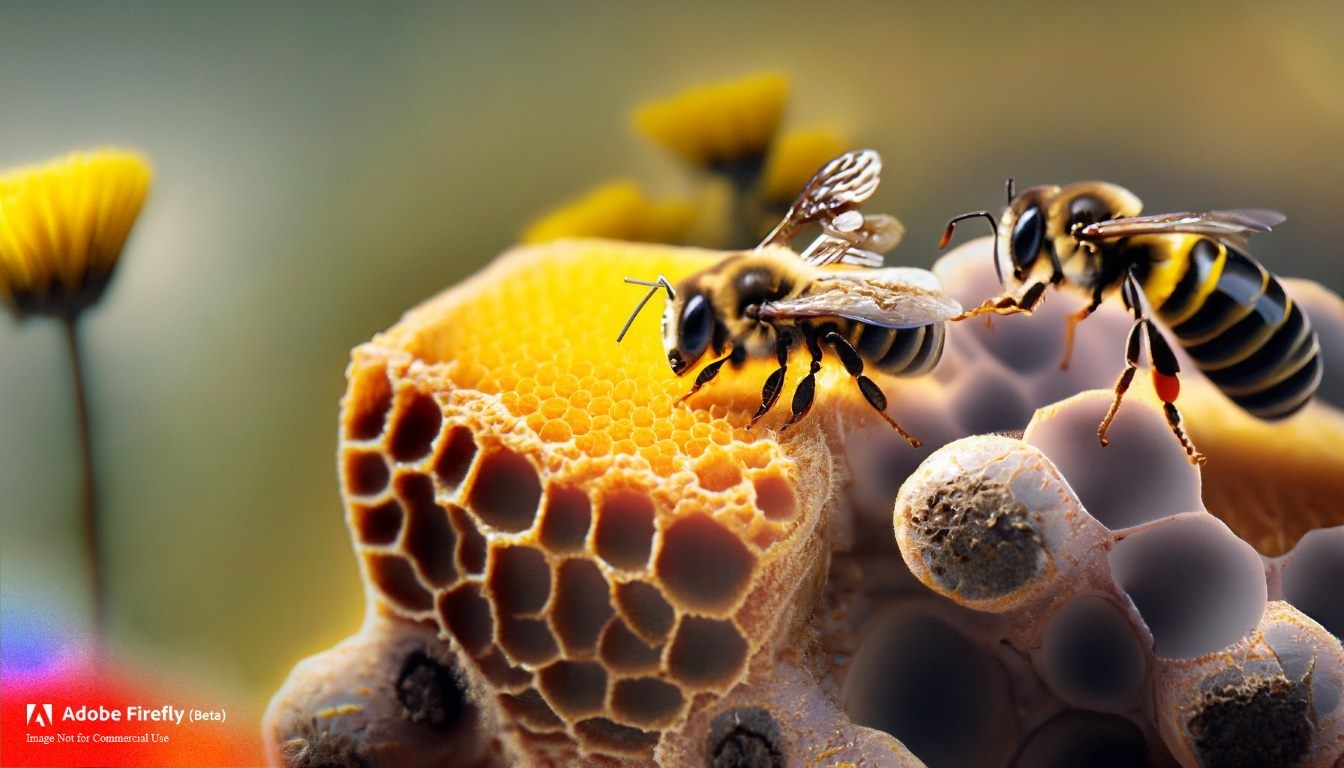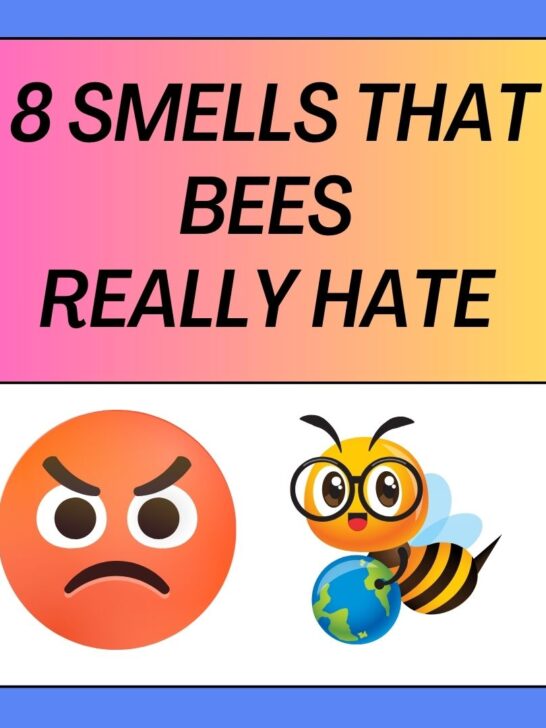Bees have highly developed olfactory senses that guide them towards nectar-rich flowers and play a pivotal role in their survival and pollination activities. However, certain scents can repel these buzzing insects and keep them at a distance. Let’s delve into eight smells that bees absolutely hate:
Post Contents
Importance of Bees in the Ecosystem
Before we dive into the world of bee repellents, it’s essential to acknowledge the incredible significance of bees in our ecosystem.
The Role of Bees in Pollination: Bees are among the most effective and crucial pollinators on Earth. They transfer pollen from the male parts of flowers (anthers) to the female parts (stigma), facilitating the fertilization of plants. This process is fundamental to the reproduction of many flowering plants, including numerous crops that comprise a significant portion of our diets.
Impact on Biodiversity and Food Production: Bees contribute to biodiversity by pollinating various wild plants, ensuring their survival. Additionally, they play a pivotal role in agriculture, pollinating crops like fruits, vegetables, nuts, and oilseeds. Without bees, our food supply would be severely compromised, leading to ecological imbalances and potential food shortages.
Smells That Bees Hate
Smell #1: Citronella
Citronella is a well-known natural insect repellent commonly used to ward off mosquitoes and other pests. Its strong lemon-like aroma is pleasant to humans but serves as a potent deterrent for bees.
Smell #2: Mint
The refreshing and invigorating scent of mint is a favorite for humans, but bees find it displeasing. Planting mint around areas you want to keep bee-free can help keep them at bay.
Smell #3: Eucalyptus
Eucalyptus, with its strong medicinal aroma, is another smell that bees dislike. Its pungent scent interferes with their ability to locate floral scents, making it an effective bee repellent.
Smell #4: Cinnamon
While cinnamon adds warmth and richness to culinary delights, bees are not fans of its spicy aroma. Sprinkling cinnamon powder or using cinnamon-scented oils can deter bees from certain areas.
Smell #5: Vinegar
The sharp and acidic smell of vinegar is a powerful bee repellent. A mixture of water and vinegar sprayed in problem areas can deter bees from building nests or swarming.
Smell #6: Garlic
Garlic has a distinct and overpowering scent that bees find unappealing. Incorporating garlic in the soil around plants can help protect them from bee visitation.
Smell #7: Mothballs
Mothballs, commonly used to repel moths, can also deter bees with their strong and acrid odor. However, it’s essential to use mothballs cautiously, as their chemical composition may have harmful effects on the environment.
Smell #8: Lemongrass
Lemongrass is a popular ingredient in various culinary dishes and herbal teas. However, bees are not fond of its citrusy fragrance, making it an effective natural bee repellent.

The Sense of Smell in Bees
To understand why certain smells repel bees, it’s essential to explore how bees perceive and use their sense of smell.
How Bees Use Their Sense of Smell: Bees rely heavily on their sense of smell to navigate their environment, locate nectar and pollen sources, and communicate with other members of the colony.
Chemical Receptors in Bees: Bees possess specialized chemical receptors, primarily located in their antennae and mouthparts, that detect odors. These receptors enable them to identify and differentiate various scents in their surroundings.
Why Bees Avoid Certain Smells
Bees exhibit aversion to specific scents for various reasons, including natural defenses against predators, avoidance of toxic substances, and preferences for floral scents.
Natural Defenses Against Predators: Many plants emit scents to deter herbivores and potential threats, including bees. These scents signal danger and prompt bees to avoid these plants.
Avoiding Toxic Substances: Bees have evolved to avoid odors associated with toxic or harmful substances. This natural aversion helps protect their colonies from potential dangers.
Preferences for Floral Scents: Bees are drawn to floral scents that signal the presence of nectar and pollen. They are less likely to explore areas with conflicting or overpowering odors.
Using Bee-Repelling Smells
Understanding the smells that bees dislike can be valuable in different scenarios. Here are some practical ways to use bee-repelling scents:
Protecting Outdoor Spaces:
- When hosting outdoor events or picnics, using citronella candles or lemongrass oil diffusers can help keep bees away from food and guests.
- Planting mint or eucalyptus around outdoor seating areas can create a natural barrier to deter bees from approaching.
Safeguarding Beehives and Apiaries:
- Beekeepers may use certain repellent smells around their hives to discourage pests like wasps and hornets from invading bee colonies.
- Placing cinnamon or garlic near hive entrances can help prevent unwanted intruders without affecting the bees’ behavior.
Preventing Bee Infestations in Homes:
- Seal cracks and openings in homes to prevent bees from building nests inside walls or attics.
- Using vinegar as a cleaning agent on surfaces and entry points can discourage bees from establishing colonies.
While these methods can be effective in specific situations, it’s essential to consider the ethical implications of deterring bees. Bees play an irreplaceable role in pollination, and indiscriminate use of repellents can disrupt ecosystems and threaten their populations.
The Ethical Considerations
As we explore ways to deter bees from certain areas, it’s essential to strike a balance between achieving specific goals and preserving bees’ vital role in the environment.
Balancing Bee Conservation and Repellent Use:
- Bees are crucial pollinators that contribute to biodiversity and food production. Indiscriminate use of repellents can harm their populations and lead to ecological imbalances.
- It’s essential to weigh the necessity of bee deterrents against the potential risks to bee populations and ecosystem health.
Environmental Impact of Repelling Bees:
- Some repellents, especially chemical-based ones, may have unintended consequences on other beneficial insects and wildlife.
- Organic and natural repellents, such as essential oils and herbal solutions, offer a more environmentally friendly alternative.
Striking a balance between deterring bees for specific purposes and preserving their crucial role in the environment requires careful consideration and responsible usage of repellent methods.
Alternatives to Chemical Bee Repellents
For those who prefer more sustainable and eco-friendly options, there are alternatives to chemical bee repellents that can help achieve the desired results without harming the bees or the environment.
Bee-Friendly Plant Choices:
- Planting bee-repellent herbs like mint and eucalyptus away from areas where you want to keep bees at bay can create a natural barrier.
- Cultivating bee-attractive plants in designated areas can encourage bees to focus on those flowers rather than other spaces.
Physical Barriers:
- Using fine mesh or screens to cover openings and gaps in buildings can prevent bees from entering indoor spaces without resorting to repellents.
- Employing natural deterrents like citrus peels, cinnamon sticks, or fresh mint around outdoor dining areas can provide a pleasant aroma for humans while deterring bees.
By using these alternative methods, individuals can coexist with bees and create a bee-friendly environment while achieving their specific objectives.
Conclusion
Understanding the smells bees hate can be beneficial in certain situations where deterring them is necessary. However, using repellents judiciously and responsibly is crucial, considering the ethical implications and environmental impact.
Bees are indispensable pollinators that contribute significantly to biodiversity and food production. Preserving their populations and supporting their well-being should always remain a top priority. Using natural alternatives to chemical repellents and incorporating bee-attractive plants can help foster a harmonious relationship with these essential insects.
In conclusion, knowing how to deter bees can be advantageous, but it should be done with utmost care and respect for their vital role in sustaining life on Earth.

94% of pet owners say their animal pal makes them smile more than once a day. In 2007, I realized that I was made for saving Animals. My father is a Vet, and I think every pet deserves one. I started this blog, “InPetCare”, in 2019 with my father to enlighten a wider audience.
